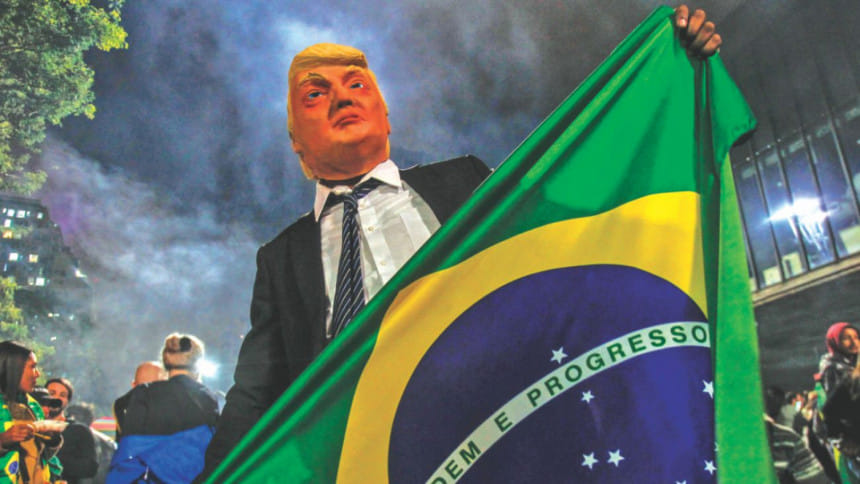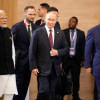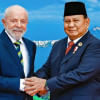In the age of massive global changes

Fundamental changes are taking place in the international system at a rapid pace. As a matter of fact, more changes have taken place in the world in the past 20 years than in the previous 200 years. These changes are all-encompassing and span many spectrums, including geostrategic, political, economic, societal, and more.
A significant change is taking place in the geostrategic space; we are witnessing the rise of new powers. The rise of the East has brought forth new economic powers like China, regional powers such as India, and power blocs like those of Brazil, Russia, India, China and South Africa (BRICS). This transformation has also brought forth geo-maritime strategies like the Belt and Road Initiative (BRI) and the Indo-Pacific Strategy (IPS) which can prove to be competitive, and even confrontational. We are indeed in a moment of transition: from a unipolar to a multipolar world.
In the political arena, this shift has been towards the exercise of rights and increased political aspirations and has seen the birth of liberal democracies. With the state gradually losing its monopoly over information, we saw the rise of civil society. All this, however, is under threat as we are now witnessing the rise of nationalism and chauvinism all over the world. This has also given birth to more authoritarian regimes such as those in Turkey and Central African Republic and the growth of hybrid democracies like in Cambodia. Rapid transformation in the economic realm has brought forth benefits of globalisation and market mobility has opened up enormous opportunities for people. At the same time, it has also invited gross income inequality which has sowed the seeds of discontent amongst people throughout the world. Therefore, we are now seeing increased pushback in the form of protectionism, illiberal democracies and trade wars.
Perhaps, one of the most volatile arenas of change has been in the field of environment and climate change. As human-induced conditions continue to trigger global temperature rise, the risks of food, water, health and livelihood insecurity are being heightened. One of the most significant resultant impacts of climate change will be large-scale displacements of populations. The certain possibility of rising sea levels will further aggravate the situation. As more and more lands are lost to the sea, millions of people will become climate refugees, causing social upheaval and even inter-state conflict.
We are also at a moment of transition when it comes to energy since we are trying to move away from fossil fuel dependency to a non-carbon economy. There is thus the possibility of wide-scale transformation in the energy sector with cleaner, renewable energy now being a priority. This is not an easy transformation and, if not managed well, it might cause massive socio-economic disruptions.
Some of the most exciting changes that are happening are in the field of digitalisation. It has touched all aspects of our lives, including the structure of governance and states. Access to digital technology has never been this prevalent; today, over three billion people in the world carry a "super computer" in their pocket in the form of a smartphone. New technologies being created by Artificial Intelligence, robotics, Big Data, etc., will completely change the way we live, communicate, educate and even the way we think. It is indeed a "GAFA" (Google, Amazon, Facebook and Apple) world, but this will also come at a cost in the short run as these emerging technologies of the fourth industrial revolution will take away our known skills, expertise and our jobs. If we are able to adapt well and re-skill ourselves, and rethink how our societies can function, the number of new opportunities will be greater than those we will have lost.
At a social level, we are seeing major transformations when it comes to women's empowerment—the #MeToo movement being a good example. These transformations have brought forth new opportunities for women around the world. Societies that continue to deny this opportunity to women will only do so at their own peril.
On the demographic front, the changes are equally massive. On the one hand, we are seeing a rapid increase in the global population with almost 83 million people being added to the world population each year, and the presence of the youth bulge in many countries in the developing world, on the other. At the same time, the world is witnessing declining populations in countries such as Russia and Japan.
A changing world creates both risks and opportunities. In the age of the fourth industrial revolution, advanced technology and globalisation are unleashing a period of unprecedented innovation that could alter our work, lives and the "known world". There are some countries that are trying to resist these seismic changes, but there are also others that are embracing this transformation and the potential to design and build a safer, smarter, healthier, and a more sustainable world. I certainly believe Bangladesh should be in the latter category so that we can build a better country for the future generations.
Major General ANM Muniruzzaman ndc, psc (retd) is the president of Bangladesh Institute of Peace and Security Studies (BIPSS). This article is based on the keynote speech delivered by the writer at the Harvard Conference on International Affairs held recently at Harvard University, USA.










Comments